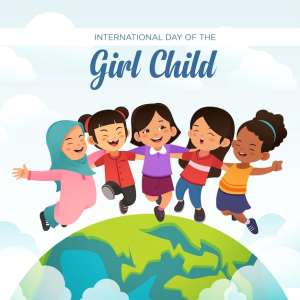
As we mark the International Day of the Girl Child, it is essential to delve into the contributions of all stakeholders in advancing the Girls' Rights Agenda. The 2023 theme for the International Day of the Girl, as articulated by the UNICEF website, is "Invest in Girls' Rights: Our Leadership, Our Well-being."
Over the years, civil society organizations, government institutions, and religious authorities have played pivotal roles in advocating for the rights of the girl child.
However, in certain African communities, rules, taboos, and cultural practices pose significant threats to the sustained well-being and education of girls. While we've made strides in getting girls into school, the question now arises, "What are we doing to ensure that girls remain in school?"
Focusing on Ghana, gender-based discrimination persists against girls residing in Ashanti villages and the Central regions along the River Offin. In these areas, it is deemed taboo for girls to cross the River Offin on Tuesdays and during their menstruation. For generations, women and young girls have been prohibited from crossing the River Offin during their menstrual cycles and on Tuesdays due to the beliefs surrounding the river's deities.
Many young girls along the river are compelled to miss school during their menstrual cycles and on Tuesdays. This restriction disproportionately affects girls, causing them to fall behind in their studies and, in some cases, drop out of school. Furthermore, it exacerbates the risks of poverty, early marriages, child exploitation, and even the peril of drowning when attempting to cross the river to attend school. This practice infringes on girls' sexual and reproductive health rights, perpetuates gender discrimination, and violates their right to education.
Curiously, the same authorities who uphold these traditional norms turn a blind eye to the degradation of the River Offin caused by illegal mining activities. Today, the River Offin is no longer pristine and safe, as it has been ravaged to a critical extent. The river, which restricts girls from attending school on Tuesdays, seemingly does not forbid illegal mining activities.
This raises critical questions about the consistency of our goals and priorities.
Shallom Abla Lumor is an activist, development practitioner, social media visibility, and social media coach. She can be reached at [email protected]




 Court dismisses Serwaa Amihere case against Henry Fitz, two others
Court dismisses Serwaa Amihere case against Henry Fitz, two others
 Stolen BRVs: Bi-partisan parliamentary probe non-negotiable — Dr. Omane Boamah
Stolen BRVs: Bi-partisan parliamentary probe non-negotiable — Dr. Omane Boamah
 Bawumia begins regional campaign tour on Monday
Bawumia begins regional campaign tour on Monday
 With great urgency backed by verifiable data, facts and figures dismiss COCOBOD,...
With great urgency backed by verifiable data, facts and figures dismiss COCOBOD,...
 EC’s statement on obsolete BVDs discovery “lies, half-truths, pure fantasies” – ...
EC’s statement on obsolete BVDs discovery “lies, half-truths, pure fantasies” – ...
 Nalerigu court impound vehicles of DCE, Director of Chereponi district for owing...
Nalerigu court impound vehicles of DCE, Director of Chereponi district for owing...
 Cop, 7 others grabbed over $523,000 Gold Scam
Cop, 7 others grabbed over $523,000 Gold Scam
 Akufo-Addo’s driver wins Dadekotopon NPP Parliamentary Primary
Akufo-Addo’s driver wins Dadekotopon NPP Parliamentary Primary
 Investigate, jail persons liable for GRA-SML contract – Manasseh
Investigate, jail persons liable for GRA-SML contract – Manasseh
 Lawyer wins Akan NPP Parliamentary Candidate primary
Lawyer wins Akan NPP Parliamentary Candidate primary
